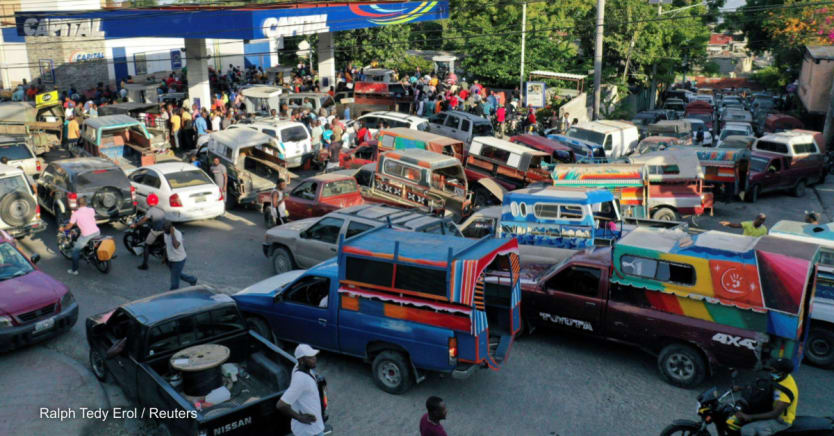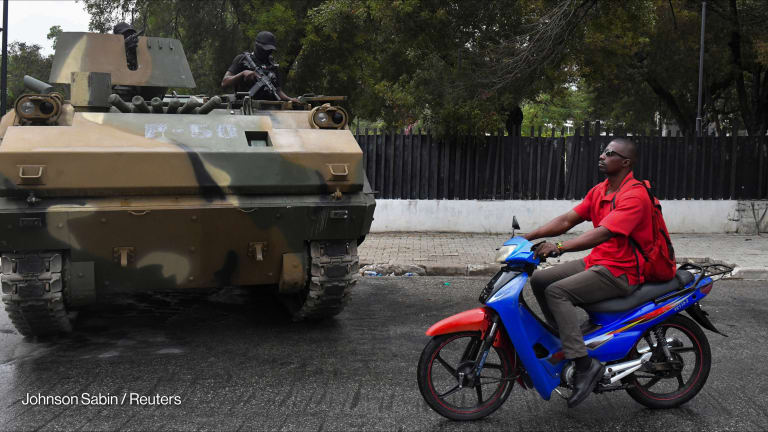
A widespread fuel shortage in Haiti is forcing NGOs to cut back on services and restrict staff movement to conserve precious resources as gangs prevent supply from reaching the population.
Gangs are largely in control of the movement of goods in Haiti, and shipments of fuel have remained at ports — out of reach for citizens in desperate need of power and transportation. An agreement made by gangs last week ahead of a public holiday Thursday has provided temporary relief.
Why Haiti's food system is so hard to fix
Despite billions in international aid after natural disasters, insecurity and lack of basic services leave the country dependent on imported food.
But Justin Colvard, Haiti country director at Mercy Corps, said his organization continues to develop contingency plans in anticipation of ongoing disruptions, and the suspension of certain NGO operations means people do not have access to many lifesaving services in a nation where over 4 million people are food-insecure.
The first hints of the fuel shortage began in June, Colvard said, and Mercy Corps began using some of its reserve stock in July even before a 7.2 magnitude earthquake struck Haiti’s southern peninsula in August. Organizations regularly maintain such reserves because of the unreliable availability.
“We’ve seen this … gradually get worse and worse over the past few months, and I think it really did hit a fever pitch during the month of October, where we realized there’s really no end in sight,” Colvard told Devex via videoconference from his office.
“Doing assessments that require cars or motorbikes, we’re extremely limited in terms of what we can do,” he continued. “And then in terms of all the administrative work, we’re in the middle of a multimillion-dollar earthquake response, and our team did not have access to electricity in the office nor in their homes.”
All of this delays emergency response efforts for the estimated 800,00 people affected by the earthquake and at a time when Mercy Corps is increasing its staff to meet heightened needs. The temporary gang truce has allowed the organization to begin refilling its reserves, which Colvard estimated would last about three months when full.
“We’ve actually just made it out by the skin of our teeth. … We’ve been able to replenish the majority of our reserves, and we’re also refueling our cars,” Colvard said. “Our big concern is that the situation over the next week will return to what it was before and that we’ll once again have to start digging into these precious fuel stocks.”
Due to the unreliable power grid, most Haitians use a combination of solar power and fuel-powered generators, and the fuel shortage leaves them with few options. People are unable to travel to school or work, communications are shut off when cellphone towers don’t have enough fuel to remain operational, health facilities cannot provide lifesaving care, and restricted access to running water increases the likelihood of disease.
Save the Children warned this week that progress on eliminating cholera could be reversed because the fuel shortage prevented water pumps from working and could force people to use unsafe sources of drinking water.
The shortage is also forcing NGOs to pick and choose which operations can continue and what must be suspended. Italian NGO AVSI Foundation has had to scale back its assistance for treatment of moderate and severe acute malnutrition because staff members can’t reach people in need — particularly in rural areas where they are more spread out, requiring additional fuel.
While indicators suggest about 30,000 families who AVSI would normally support have experienced the most severe levels of food insecurity, restrictions caused by the fuel shortages and ongoing insecurity mean the organization is only able to meet the needs of 5,000 to 10,000 of them.
“Priority goes to the worst indicator. … We have to choose what area we can reach,” said Fiammetta Cappellini, AVSI’s country representative in Haiti. “This means that in the near future, we probably will see a worsening of indicators.”
She said that because AVSI is unable to treat children with moderate acute malnourishment, rates of severe acute malnourishment are likely to rise in the next two to three months as moderate cases worsen.
AVSI was also planning to help rebuild schools that were destroyed in the earthquake, but the fuel shortage has prevented the group from obtaining construction supplies.
The fuel shortage and last month’s kidnapping of 17 American and Canadian missionaries — who have yet to be released — have led organizations to ask important security questions about the extent to which they can safely carry out their operations. Both international and national staffers are at risk.
With the end of daylight saving time this month, employees must leave work even earlier to ensure they can arrive home while it is still light outside. To get to work, most national staffers rely on public transportation, which has also been severely restricted by the fuel shortage.
Limited electricity in the evenings can make people feel vulnerable to robberies in the dark while at home. Cappellini said some employees who don’t live within walking distance of the office have chosen to sleep overnight at the homes of colleagues who live closer so they are still able to go into work.
“As humanitarian actors, we have a security protocol. And for Haiti, it is very restrictive. So we travel and we are on the road only for work-related activities and for the other things. … There are no other things in our lives in this moment. We have a curfew at 8 in the evening, ongoing in the last six months,” Cappellini said. “It’s very restrictive, but is quite normal for us.”
Robyn Fieser, a spokesperson for Catholic Relief Services in Latin America and the Caribbean, said that its staffers remain in the country for the moment “but that could soon change.” CRS was forced to curtail lifesaving activities “as it becomes nearly impossible to continue operations” due to the fuel shortage, she said.
Constantly monitoring the situation also requires an immense amount of NGO staff capacity that previously could have been dedicated to direct programming.
Seed access woes prevent growth of Haitian agriculture
A lack of quality seeds is preventing Haitian agriculture from thriving and feeding a hungry population.
“There was a point in time where we were going through multiple contingencies. We say this a lot in Haiti: plan B, plan C, plan D. … Who needs to be present in order to keep business continuity rolling in terms of security analysis, in terms of payroll, in terms of basic business functions any business needs to have operational?” Colvard said. “It’s really been pervasive and all-consuming in terms of my role, in terms of all that contingency planning, the security planning.”
Part of that security planning includes maintaining fuel reserves for emergencies such as an evacuation. AVSI has a predetermined amount of fuel to always keep on hand for an emergency evacuation or to transport someone to the hospital. The group cannot tap into that stockpile for regular operations.
Cappellini stressed that while work in Haiti can be dangerous for expats, national staffers are routinely in more danger.
“These national staff [members are] really giving a living proof of enormous courage to do their work in this kind of situation,” Cappellini said. “The highest risk is for them and not for us.”
Search for articles
Most Read
- 1
- 2
- 3
- 4
- 5








